- >>
- Birds Online – English
- >>
- General facts
- >>
- Found an escaped budgie...
Found an escaped budgie – what to do?
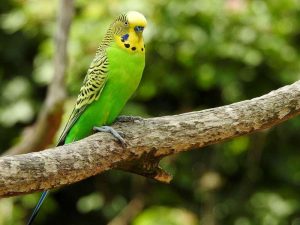
If a budgie flies right into someone’s home through an opened window or is found and caught outside, there is usually an immediate need for action to help the bird. Frequently, the found birds are starved out, during some seasons they most probably are hypothermic, possibly they have injuries, and often they need rest urgently. Unfortunately, in a situation like this, many people who found an escaped bird are making mistakes. The bird’s life depends on what we do, and also our own birds could be affected in case we do something wrong.
In this chapter, you will learn what is most important and what you should avoid if you have found a budgie outside. By the way, what is mentioned here also applies to almost all other pet bird species.
Keep the bird in quarantine
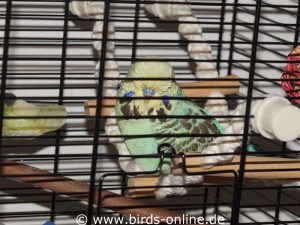
To find a pet bird outside or to experience that a budgie suddenly flies through the open window right into your house will most likely cause excitement in the first moment, both for the animal and for you. This can happen to bird owners as well as to people who do not own birds. The latter are in advantage if they take an escaped bird into their home because there are no other birds around who could be infected by the found bird. Unfortunately, it can happen that a bird who has been picked up outside or flew in through the open window has pathogens “on board”. The animal can spread these germs to other birds in case you allow direct contact (remember Covid-19!).
So with the attempt to help the found bird as quickly as possible, as a bird owner in particular you can all too easily take a wrong decision. Therefore, it is important to keep calm and act deliberately. Do not let a found bird, despite all pity, be together with its own birds in the same room or even in the same cage/aviary. One does not necessarily see it if a bird is infected with parasites, bacteria, or other pathogens. If the escapee came close to other birds or would drink from the same water bowl, a transmission of the disease could happen. Instead of one sick bird, you would then quickly have to deal with at least two or even a whole flock of infected birds in the worst case.
For this reason, birds who have been found or who have flown right into your home always should be kept in a separate cage and in a different room than your own birds. This quarantine is very important. For its own safety, the found bird should also be presented to an avian vet as soon as possible. But first, you have to feed the escapee.
Not too much food at first
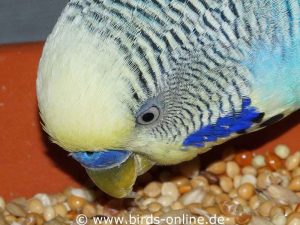
Outside, budgies and other pet birds often starve because they don’t find enough or proper food. Therefore they’re very hungry or maybe already quite weak. Of course, you should offer food and water as first aid. But attention! If you offer a found bird a lot of food as a first meal, there is a danger that the budgie will overeat. In the worst case, this can lead to severe circulatory disorders, from which birds can even die.
To be on the safe side, just serve about half a teaspoon of seeds and let the budgie eat this food quantity. Afterward, a break of one to two hours should be made and again a similarly small quantity of food should be handed. Then pause again, preferably three to four hours. If the bird is doing well and does not show any circulatory problems, a normal amount of food can then be served. The first big hunger is satisfied and there is no longer the danger that the bird will eat too much at a time. Let the bird drink as much as she or he wants. Drinking is very important and will in most cases have no negative effects on the circulation.
Watch the bird carefully

After the bird was outside for a while, she or he should first have a rest. Nevertheless, you should watch the budgie carefully while she or he is eating or sleeping a little bit. Does the animal have visible injuries? Is the plumage around the cloaca stuck together? Can you spot parasites in the plumage? Does the bird smell strange?
Please remember every noticeable detail and write it down. Also, pay attention to how the bird’s excrements are looking. It is best to take a photo of the feces and also collect some excrement without sand sticking to it. You can put the feces in some cling film – you will need it later when you visit the vet for an examination.
Please keep in mind: The bird is not familiar with you and will therefore most likely try to hide any ailments from you. So please check very carefully if you notice anything unusual. Every little sign of an illness that you notice and later tell the vet about it can be life-saving.
Check-up at the avian vet
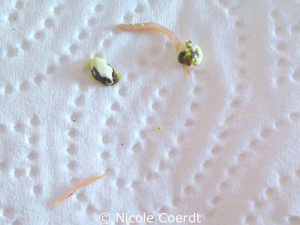
Take the found bird to an avian vet as soon as possible for a check-up and make sure you take your notepad, the feces sample, and any photos of the droppings with you. Only a vet can accurately diagnose whether the bird is healthy or not. During the examination, she or he can also check the leg ring or whether the bird wears an ID microchip. The latter is however untypical with budgies. Usually, only bigger parrots wear such a “passport”.
For safety reasons, an experienced and responsible vet will advise you to keep the found bird in quarantine for a while. No matter how much the budgie may call for your birds, do not give in! Unfortunately, many pet birds get infected with roundworms or Trichomoniasis while they roam Central European nature. Both are parasites that are all too easily transmitted to other birds. Therefore the basic rule should apply to you: Only when all test results are available and the vet tells you that everything is all right, a found budgie should be allowed to get close to your own birds.
- Injury caused by predator attacks (birds of prey, ravens, and domestic cats are frequent attackers)
- Bone fractures due to collisions with cars or window panes
- Poisoning through consumption of toxic plants
- Parasites like feather mites
- Infestation with (bird) ticks, frequently around the eyes, what makes the birds then scratch themselves until they bleed
- Trichomoniasis (Canker) – caused by internal parasites that can be found in the upper parts of the respiratory and digestive system
- Roundworms – internal parasites found in the guts
- Bacterial infections of the digestive system after drinking polluted water
Very important: Keep the receipt after you’ve been to the vet. Because if necessary, you can arrange with the actual owner of the bird that she or he will pay the costs. But please do not rely on someone else taking over the costs later. The most important thing for you should be to help the bird first. This costs money, but the found budgie cannot help itself and is dependent on people who are willing to stand up for her or him. And this means that in some cases the costs will not be refunded by someone else.
Finding the bird’s owner
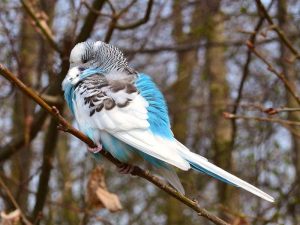
Possibly somewhere the owner of the bird you found is sadly looking for his beloved pet. Since budgies can travel quite long distances in one day, you should look for the owner not only very close to the place where you found the bird. It’s usually not very helpful just to place an add on a notice board at a local supermarket, for example.
Contact the municipal animal shelter and report that you have found a bird. It can also be helpful to contact animal shelters in neighboring cities as well. Take a look at the daily newspaper and read the advertisements looking for escaped birds. Maybe you would like to advertise yourself to find the actual owner of the found bird. You should proceed similarly with advertisements on the internet, especially on social networks like Facebook.
